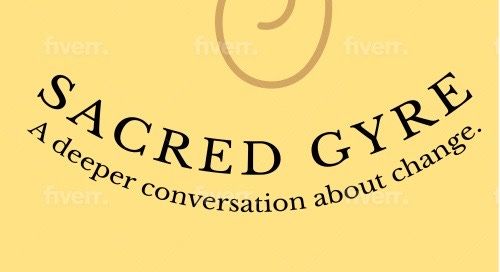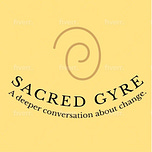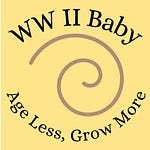In the 13th Episode of my Sacred Gyre podcast, I went into some detail on the sources of, and how I think about, my own spirituality. I spoke of ways in which I was inspired by my Dad, and some of the most important things in my own life that were part of the evolution of my personal sense of it.
Over several episodes I've shared my thoughts that one’s spiritual aspect need not be about religion per se, although, for many people, that is a very important aspect. But my definition of spirituality applies to all of us, I believe, whether we belong to or believe in a specific religion, are religious in a more general sense, are atheists or agnostics or don't care to specify any of these. My definition implies a universal question. Let me explain.
We all have, at a minimum, 3 things that matter to our survival and happiness. They include healthy food and water, shelter, and relationships to other people that support us in thriving on a physical and emotional level.
We are not born as, nor do we live as, isolated individuals. Without connection to family in infancy and early childhood we die. That is because all three of our needs at birth are provided by those who raise us. As we grow into childhood and adulthood we also evolve mentally, emotionally and physically.
Each of us is both made of a common biology and consciousness and are simultaneously and absolutely a unique combination of all that is our human potential. This means that the job of raising each of us is both similar to and unique compared to other humans. Our parents constantly ride that wave of our individual evolution as a person. And we are constantly reacting to our changing relationships to the humans around us as we grow and mature. So even at the family level life is already complex.
As our societies become larger, we increasingly specialize in how we produce, especially, things like food and shelter. And organizing that specialization, the ways we work and the necessity to trade what we produce for what others produce, leads to higher levels of organization.
From small groups that traded with other small groups in ancient times, to towns, cities, regional governments and economic units, to countries, modern life has become complex relationships nested in ever larger complex relationships. That complexity has been with us and has evolved from the beginnings of our species, and, if I am correct in my thinking, it will never go away.
As individuals who make up those groups upon which we depend, there is an implicit aspect to our being. For me, that grows out of the universal question I alluded to above. And that question is;
What matters to you that is larger than yourself?
I believe we have evolved as a species to care about things that are larger than ourselves. This becomes ever more important if we are to be successful in living in modern complex societies. I believe this is true even if we don't usually think about it consciously. But evolution is an ongoing process, whether in the physical world or in our emotional and spiritual lives. For me, the things that I am aware of that influence my spiritual aspect, or my sense of what matters to me that is beyond myself, is also ever evolving.
Recently I was reminded of this through a chance encounter.
One of the things that affects my personal evolving sense of spirituality is my wide-ranging interests in reading, learning, and integrating my own experiences into my thinking. As I create my podcasts, I read relevant books and articles and watch videos or listen to other people’s podcasts. Along with my own experiences, they underlie how and why I write.
But I also run across information that I think will be relevant to future episodes, or ones that I think may challenge me in some way. And when I am not doing work relevant to upcoming episodes, I often dive into one or more of them.
This happened when I found and read a book titled How Life Works, A User's Guide to the New Biology, by Philip Ball. I am utterly fascinated by this book, which is based on modern scientific studies of our biological development. It is one I would recommend to anyone, and one I will read again and explore more deeply for a Butterfly Arose episode in the future.
But soon after I put the book aside for the time being, I was alerted to an article Mr. Ball wrote for The Nautilus online magazine. Just as he was about to publish his book, he was diagnosed with prostate cancer, and that diagnosis prompted his writing of the article. He titled the article How Life Really Works.
He says his treatment for the cancer is going well and doctors say his prognosis is positive. In reaction to the emotional ups and downs of being diagnosed with cancer and starting treatment, in the article he says, "To my surprise, I found solace in what writing How Life Works had led me to conclude about the nature of life itself. I am now more amazed by life than ever."
In his book he goes into detail using extensive scientific research that reveals deeper insights into how our bodies develop, grow and navigate an ever-changing world. His writing synthesizes these studies, and they demonstrate that our bodies are not the result of an automatic transcription controlled by our genes. Instead, he says, "For complex organisms like us, control is decentralized and distributed across many levels, each of them largely insulated from the finer details of what happens on the levels below."
Rather than "a prescription written into our genome," as he puts it, we are blessed with things like gene regulators, cells full of proteins that are disordered and have the ability to "converse with one another in reaction to their environments at different levels." This gives our cells flexibility, as he says, " to find collective solutions to the noisiness and unpredictability of life at the molecular and cellular scale. This is what makes us robust. It is, indeed, surely what makes us possible at all."
This variability is what gives rise to the range in things like size and shape of our bodies, indeed it is part of what underlies even our variations in psychological characteristics. In my Butterfly Arose podcast I looked at what we know about people born with a variation in sex characteristics we call intersex in two podcasts, Part I and Part II.
Most of us are born with variations in physical sex characteristics that fit good enough into the classifications of male and female. Some males, for one example, have longer penises and some shorter ones. At a certain length, doctors may diagnose a male as having what they call a micropenis. As an article I read from the Cleveland Clinic points out, a man with a micropenis can have a normal life, can pee or have an erection, but might not be able to engage in penetrative sex necessary for impregnating a female. Such a person is still classified as male.
But a small percentage of people are born with variations in sex characteristics that do not fit easily into either male or female physically. One example is babies born with androgen insensitivity syndrome, or AIS, which you can read about in an article I read published by the Children's Hospital of Philadelphia. Children born with complete AIS are assigned female at birth, and mostly grow up as cisgender women, but don’t have uteruses or fallopian tubes. They also have undescended male testes. Those with partial AIS may have physical sex characteristics of male or female bodies and may grow up with a gender identity of a man or a woman.
Unless they have some other difficult health condition, babies with AIS can grow up and live normal, healthy lives as long as the world around them does not place unnecessary burdens on them. One thing that made the lives of intersex people difficult in the past, and even to some extent today, is the beliefs of the society around them. Beliefs that they were abnormal, when in fact intersex people's bodies are a part of the norm of how humans’ physical bodies might develop.
The old cultural belief was the reason doctors used to do operations on them as babies. The aim was to make their physical bodies resemble those of the majority of people. Operations that, thanks to the advocacy of intersex people over many decades, are becoming much less likely to be done in our country.
Just take in for a moment the complexity of our lives on the level of both biology and culture. We are both born with bodies and born into cultures that have a range of characteristics that are possible, AND with variations that sometimes do not fit our current beliefs about what we've been taught to think of as normal. Thankfully, those beliefs with respect to people born intersex are changing. And we all constantly work to adapt to our ever changing and evolving world.
I think this reflects what Philip Ball is saying in his book and especially in this article, How Life Really Works. Some of our cells, he points out, over time exhibit a variation on how cells normally work, but a variation that represents a kind of deranged development. Our cells have the inbuilt ability to reproduce themselves, otherwise we would die. But some cells start reproducing themselves in a way that is destructive to our health; this is what we call cancerous cells.
Mr. Ball points out that, for the time being, we are stuck with things like surgery and chemotherapy to treat cancer. While these treatments save lives, they can also be very hard on our bodies. Often, they end up killing healthy cells along with the cancerous ones. But the reality that cancer cells are a variation on normal means we may be able to find ways to coax those cells back into a healthy stage of development.
We are, Mr. Ball says, atoms and cells in flux. Our bodies are an ongoing conversation in which different parts talk to each other and affect each other at different levels. Nobody is absolutely in charge, but every part of ourselves has some ability to affect how our bodies work and thrive. There are variations in how our bodies work that allow us to lead normal, ordinary lives, variations that may be a reason why some people suffer less than others from things like a cold or the flue. And there are some variations that can lead to things like cancer.
He says this view, that emerges from scientific research, says that our bodies also acquire a type meaning as they grow and develop. Not meaning in the sense of mental thoughts. Our cells can't think the way our minds do, thinking emerges at a much higher level of the organism. What we learn from the studies of our biology, is that our bodies, in his words, "know what matters, by both hard-wiring and experience. By attending to and differentiating what is around them, they create meaning." We are "whirlpools of meaning," he calls it, and part of that meaning comes from our connections to each other as humans, the highest level of our beingness.
So, there is the meaning, or knowing of our cells that comes from their interaction at the low level of their biological surroundings. There is the higher level meaning that develops in our minds. From both our hard wiring and our ongoing experience interacting with each other we create meaning. And we also create meaning as we experience and react to the larger physical worlds we create that can sustain us in some ways, and at times harm us. In the case of cancer, we create some things, like cigarettes, that can cause cancer to develop in our bodies and others, like healthy foods, that help us to thrive.
Mr. Ball says that while he is hopeful about his cancer treatments, he of course has no idea how long he will live. Still, his research gives him hope that for whatever time he is here he gets to be, "a part of the universe that gets to spin for a time, and to create a unique pocket of meaning: That is indeed something to be grateful for."
As I read this article, I felt an inner sense of joy. What he is saying connects to my own sense of the world as filled with complexity on level after level. It tickles my conscious brain and enlarges my own sense of meaning derived from my life experiences, my connection to my Dad, and what I've learned from my professional and personal life. And it reinforces my internal commitment to the values I try to live by, to my already strong commitment to doing what I find meaningful in both my personal and professional life.
Beyond my thoughts and feelings, those values and commitments are intertwined with my very biological beingness. And I love that my tendency on both a conscious and subconscious level to be at times attracted to things that are not immediately practical sometimes leads me to articles like this one by Philip Ball. Of course, my constant searching and allowing my attention to be drawn toward such things could as easily be a distraction and interfere with my productivity.
But in cases like the book and article by Mr. Ball, it also can lead to enriching both the intellectual and spiritual aspects of my life. My body notices ways they add to my sense of wonder, of awe, often enough that I stay open to these serendipities even as I try to be thoughtful about not allowing this tendency to go overboard. And that is an evolution of my sense of spirituality that I decided to share with you.
It is a way, in my own life, that the complexity of my biological self is intertwined with and reflected in my utterly complex conscious self. That I am both a being living within constrained potentials, and one that is open to evolving as I converse with, engage with, the world around me. Something that is true on both the cellular level, and on the level of my conscious awareness.
Thank you for listening, and I hope you are aware of the ways that small differences in how you attend to the world around you can lead to learning and growing, even as you are also mindful of staying in a basic sense of equilibrium. I hope you find meaning and joy in your own experiences of this amazingly complex world we inhabit. And I hope that you will become more aware of the ways you react to that complexity which may help or hinder your own sense of meaning and the values you derive from that meaning to help make this a better world for all.











Share this post